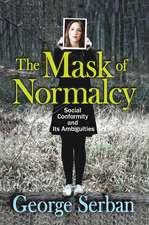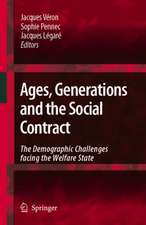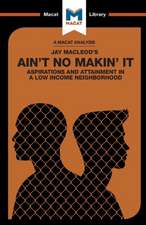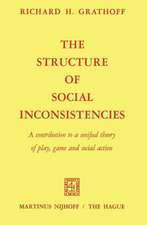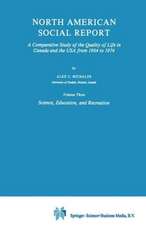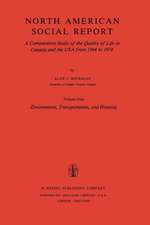Family Care and Social Capital: Transitions in Informal Care
Autor Patrick Barrett, Beatrice Hale, Mary Butleren Limba Engleză Hardback – 19 aug 2013
Informal care is conceptualised as occurring with the context of personal interrelationships, these being nested within wider kin networks and linked with wider professional formal care networks. Informal care is seen both as an expression of social capital and as an activity that builds social capital. It is an indicator of resources of mutual support within social networks, and it has the effect of adding to the stock of social resources. The book makes a case, therefore, for facilitating the development of social capital by strengthening the capacity of informal caregivers and caregiver groups, and by improving the linkages with formal care organisations.
| Toate formatele și edițiile | Preț | Express |
|---|---|---|
| Paperback (1) | 635.31 lei 6-8 săpt. | |
| SPRINGER NETHERLANDS – 26 aug 2015 | 635.31 lei 6-8 săpt. | |
| Hardback (1) | 641.53 lei 6-8 săpt. | |
| SPRINGER NETHERLANDS – 19 aug 2013 | 641.53 lei 6-8 săpt. |
Preț: 641.53 lei
Preț vechi: 754.74 lei
-15% Nou
Puncte Express: 962
Preț estimativ în valută:
122.75€ • 128.17$ • 101.60£
122.75€ • 128.17$ • 101.60£
Carte tipărită la comandă
Livrare economică 04-18 aprilie
Preluare comenzi: 021 569.72.76
Specificații
ISBN-13: 9789400768710
ISBN-10: 9400768710
Pagini: 240
Ilustrații: XIX, 170 p.
Dimensiuni: 155 x 235 x 20 mm
Greutate: 0.45 kg
Ediția:2014
Editura: SPRINGER NETHERLANDS
Colecția Springer
Locul publicării:Dordrecht, Netherlands
ISBN-10: 9400768710
Pagini: 240
Ilustrații: XIX, 170 p.
Dimensiuni: 155 x 235 x 20 mm
Greutate: 0.45 kg
Ediția:2014
Editura: SPRINGER NETHERLANDS
Colecția Springer
Locul publicării:Dordrecht, Netherlands
Public țintă
ResearchCuprins
Chapter 1: Family Care and Social Capital.- Chapter 2: Informal Care in Social Context: An Expression of Social Relationships.- Chapter 3: The Dynamic Experience of Caregiving.- Chapter 4: Informal Caring and Early Childhood.- Chapter 5: Caring for Family Members with a Lifelong Disability.- Chapter 6: Caring for Adults with Acquired Disabilities.- Chapter 7: Caring for Older People.- Chapter 8: Caring across the Generations.- Chapter 9: In support of Informal Carers.
Textul de pe ultima copertă
Becoming a caregiver is increasingly an inevitable experience for many people and, therefore, a likely life transition. Drawing on research and personal experiences of working with family caregivers, this book examines a range of family caregiving situations from across the life course. It seeks to capture the dynamics of caregiving in a number of common situations: caregiving during infancy, for adults who acquire a disability through accidents or illness, for older people with age-related issues, and caregiving by children and adolescent carers and grandparent carers. In drawing attention to key moments of vulnerability faced by family and informal caregivers, and by suggesting how to assist ‘reconnection’ at these moments, the book provides a guide for those working in the area of health, disability and care.
Informal care is conceptualised as occurring with the context of personal interrelationships, these being nested within wider kin networks and linked with wider professional formal care networks. Informal care is seen both as an expression of social capital and as an activity that builds social capital. It is an indicator of resources of mutual support within social networks, and it has the effect of adding to the stock of social resources. The book makes a case, therefore, for facilitating the development of social capital by strengthening the capacity of informal caregivers and caregiver groups, and by improving the linkages with formal care organisations.
Informal care is conceptualised as occurring with the context of personal interrelationships, these being nested within wider kin networks and linked with wider professional formal care networks. Informal care is seen both as an expression of social capital and as an activity that builds social capital. It is an indicator of resources of mutual support within social networks, and it has the effect of adding to the stock of social resources. The book makes a case, therefore, for facilitating the development of social capital by strengthening the capacity of informal caregivers and caregiver groups, and by improving the linkages with formal care organisations.
Caracteristici
Caregiving situations at different life course stages Focus on key moments of vulnerability faced by family and informal caregivers Focus on facilitating the development of social capital Includes supplementary material: sn.pub/extras




